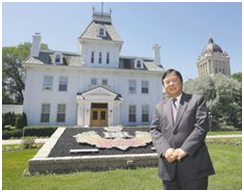 Philip Lee arrived in Winnipeg, fresh out of high school in Hong Kong, in the late summer of 1962.
Philip Lee arrived in Winnipeg, fresh out of high school in Hong Kong, in the late summer of 1962.
The youngest of nine children from a well-to-do entrepreneurial family, Lee held a British passport. He was sponsored to Canada by his sister Angeline, who had moved to the Manitoba capital earlier to study education at the University of Manitoba.
His initial reaction upon arriving in Canada? "Wow, it's so spacious. The air is so clean," Lee said recently.
Unlike Chinese immigrants in years past, Lee's acclimation to Winnipeg -- other than the cold and the mosquitoes -- was relatively easy. His sister, an outgoing woman who made friends easily and had married a University of Manitoba agricultural economist, was established in the community.
Lee settled in Fort Garry, near the university, and studied chemistry. His plan was to obtain an undergraduate degree and then return to Hong Kong to article in law. But by the time he graduated, political tensions between nationalists and communists in the then-British colony caused him to change his mind. Rumours swirled about a possible British pullout.
On the advice of his mother, who had also moved to Winnipeg, Lee decided to put down roots.
The man who would become Manitoba's first lieutenant governor of Chinese descent parlayed his science degree into a job with the Metropolitan Corp. of Greater Winnipeg, a municipal umbrella organization that predated Unicity. He worked as a chemist, studying the city's water. One of his early discoveries was that Winnipeg was using far more chlorine in its water than was needed. He worked for the city for 38 years, eventually becoming branch head for industrial waste.
As a young, educated man who spoke good English, Lee caught the attention of longtime respected Chinese community leader Charlie Foo. Although he was still in his 20s, Lee found himself introduced by Foo in the late 1960s to then-mayor Steve Juba, the local police chief and other prominent Winnipeggers as his heir apparent.
In 2009, when Lee was named the province's 24th lieutenant governor, there was joy in Manitoba's Chinese community. Lee's title was a sign there were no limits now on what their children could accomplish here.
The appointment also showed how far Canada had come in embracing people from all ethnic communities.
"Suddenly, the ethnic groups all sort of circled around me," Lee recounted recently. "They said, 'If you can be appointed the Queen's representative, all our children in the future will have a chance for any position in the government.' "

